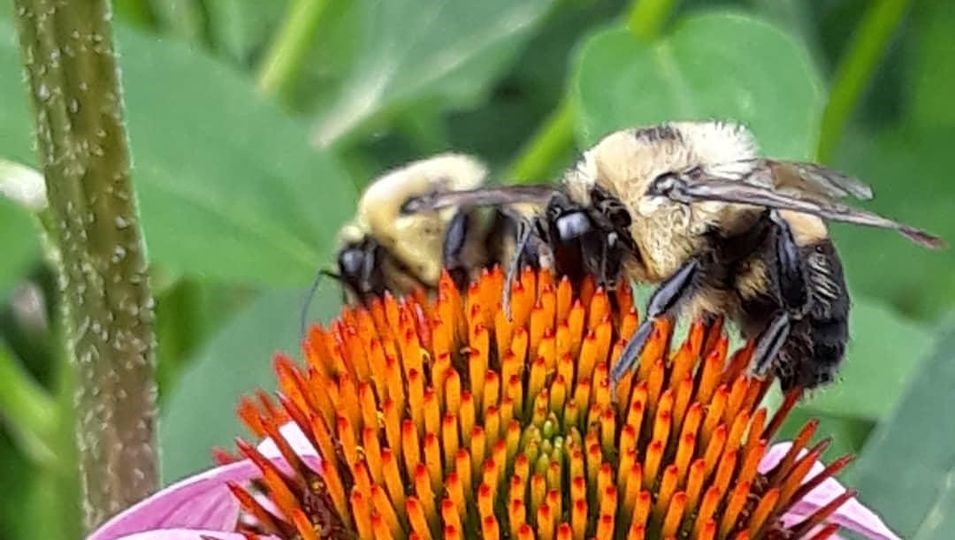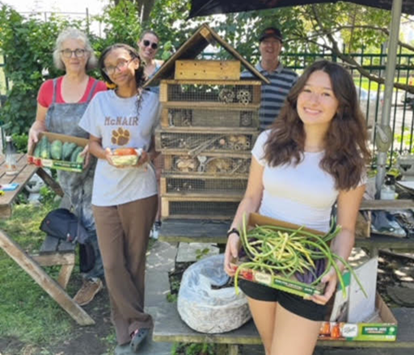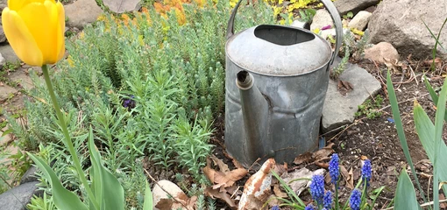
Gardening to Improve Health Outcomes
Riverview Community Garden provides gardening opportunities to Jersey City residents of all ages. Programs include:
- Community Food Share, which provides free organic vegetables.
- Green Ambassadors / 4-H Urban Farm Club, which invites city kids to grow food and become garden stewards.
- Community composting, which offers a food scrap drop-off.
- Beekeeping, which maintains hives to pollinate plants and produce honey.
HealthierJC + Riverview Community Garden

Riverview Community Garden believes that building a Culture of Health begins with access to healthy food and healing herbs grown in organic soil, without pesticides. Many people in the community do not have access to fresh organic food, cannot afford organic vegetables or simply do not have outdoor space to grow a garden.
Building a Culture of Health starts from the ground up, by creating good soil to grow healthy plants and healthy people.
In awarding the mini-grant, HealthierJC acknowledged the ongoing contribution of Riverview Community Garden in advancing a Culture of Health by introducing families to urban “farm-to-table” practices and nutritional benefits in all Jersey City neighborhoods.
 How was the Mini-Grant Used?
How was the Mini-Grant Used?
The HealthierJC mini-grant helped to educate community members about growing organic food, supporting pollinators, understanding medicinal herbs, beekeeping practices, and composting.
Riverview Community Garden’s five recurring programs and workshops from June through September 2023 included:
- 4H Urban Farm Club
- Intro to Honeybees and Beekeeping
- Honeybee Colony inspection and ID workshop
- Herbal Medicinal Garden Tour and Tasting
- Herbs for Anxiety Workshop
The mini-grant served 160 minority, low-income residents in Ward D, including seniors, youth, and individuals with disabilities. Fifteen participants were kids in the 4H Urban Youth Farm Club, 45 were garden volunteers, and some 100 were “drop-ins.” On Saturdays, 4H Club teens in collaboration with the Riverview Community Garden ran beekeeping and medicinal workshops, stocked community food pantries with nutritious garden-grown organic veggies, and made several garden enhancements:
- Adding parent seating next to the Children’s Garden
- Planting more medicinal, native, aromatic, and pollinator plants
- Creating a meditation space
Making a Difference
Riverview Community Garden witnessed an amazing transformation in 4H Club teen participants. They started superficially interested in the program and preoccupied by their phones, but after a few weeks these young adults became fully immersed in the “farm-to-table” lifestyle. They learned how to grow food, make nutritious meals for their friends and families, and to compost their scraps to recycle nutrients back into the soil. Respect for the natural world further deepened as they observed beehive colony behavior, and took the time to research, touch, smell and taste medicinal herbs.
 One fifteen-year-old 4H teen who had never grown produce, became very interested in growing tomatoes. He then learned how to propagate tomato plants and eventually took one of the plants home. After returning home from a summer family vacation, he sent 4H leadership this message:
One fifteen-year-old 4H teen who had never grown produce, became very interested in growing tomatoes. He then learned how to propagate tomato plants and eventually took one of the plants home. After returning home from a summer family vacation, he sent 4H leadership this message:
“I’m back from India and I just heard about the [upcoming community garden] presentation you are planning. Is it cool with you if I bring in my tomato plant (I know, shocker) and explain proper gardening techniques, because mine is actually rooting very well and has two budding tomatoes!”
He then proceeded to prepare for and deliver a talk about different ways to cultivate tomatoes, including hydroponics, and the pros and cons of each cultivation method.
And then there was the 4H teen on the autism spectrum who spent the first week facing away from everyone with her hood up, avoiding eye contact and group interaction. By the final week of the program, she had harvested a box of vegetables to cook at home, and was actively involved in constructing a community honeybee house.

Moving forward…
Riverview Community Garden believes that community gardens uplift the mind, rejuvenate the body, and contribute to a healthier world. It hopes to maintain engagement by either:
- Allowing residents to tend their own plots, or
- Finding volunteers for the community youth food-share program, which cultivates three plots planted by the Green Ambassadors and the 4H Urban Farm Club.
One volunteer said, “Working in the garden provides cardiovascular exercise, growing healthy food builds a strong body, the use of medicinal herbs and honey from beekeeping improves health, seeing plants grow and bloom reduces stress, and being part of a community project increases a sense of belonging.”
For more information, call (973) 432-1893
